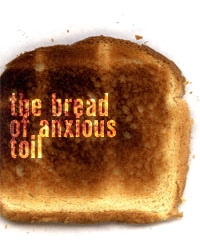The bread of anxious toil

The fourteen-hour workday is a perfect metaphor for a way of life so ingrained in our culture that it has virtually become a status symbol. It is as if the busier we are, the more important we must be. I wonder how many of us feel that our lives are justified only if we are continually occupied, flying from one activity to another, from one urgent task to the next. Our cultural values urge us toward a perverse pride in being overextended. If work is good, more work must be better! Isn’t it how much we accomplish that gives us our worth? If we believe this, we can keep ourselves near the borders of exhaustion in the name of productivity, commitment and responsibility. We can even do it in the name of God’s “will”!
The second verse of Psalm 127 is quite challenging: “It is vain that you rise up early and go late to rest, eating the bread of anxious toil; for God gives to his beloved, even while they sleep.”
Within this world, work is a necessity, and within the church, active service is an expression of our call. The problem is not work or service. The problem is the pervasive anxiety that we have too much to accomplish in too little time; the worry that what we do will be inadequate, unappreciated, not thought “good enough.” It is inner turmoil, felt in the rush and pressure of conflicting concerns, that does us violence.
“It is vain that you rise up early and go late to rest, eating the bread of anxious toil.” The bread of anxious toil — isn’t that a choice description of what we try to sustain ourselves with? We can literally fill ourselves with it, day after day, gulping it down in guilty haste. It is not the toil, but the anxiety that distorts God’s glory in our lives. God’s goodness and love are obscured by anxiety; anxiety refuses to believe that the Lord “gives to his beloved, even as they sleep.” Isn’t that a lovely description of pure grace — unearned and un-earnable? God delights in children who trust enough to rest in peace, knowing they are embraced by divine care… .
In our rapidly changing society, we are especially obsessed with what lies ahead. Why else would we expend so much energy forecasting the economy like weather? Why is much of American religious culture fixated on the Book of Revelation? Why do mainline church leaders try so hard to predict the future of our denominations? We want to know outcomes in advance. Why? Is it not so that we can be as much in control as possible?
Our anxiety about tomorrow seems to be connected to a rather astounding conviction that we could handle things better than God, given half a chance. Maybe that’s why some of us take chances wherever we can find them. We keep trying to occupy the driver’s seat in this universe. But the seat is just too big for us. So our need for control turns around to terrify and enslave us. It is very stressful to have to be in control of everything!
I hope we’ll catch on to the idea that “the bread of anxious toil” is not so necessary as we imagine it to be. Certainly it is no source of sustenance! It is a bitter food, draining away courage, dissipating our energy, sapping away joy and gratitude, and leaving us brooding and exhausted. The bread of anxious toil is truly miserable fare!
Thank God there is another kind of bread, an antidote to the slow poison of anxiety. There is a bread that nourishes us to the core. It refreshes the spirit, calms the mind, heals us, body and soul. Even in the midst of trying circumstances, it offers love strong enough to cast out fear, inspire trust, restore joy, bring peace. This is the Bread of Life, Christ, our God incarnate: “O taste and see that the Lord is good; blessed are all who trust in him” (Psalm 34:8). To taste the Bread of Life is to know quiet confidence in the midst of frantic activity and confusion.
—Marjorie J. Thompson, author of Soul Feast
Read more in the feature article, Hovering anxiety.






